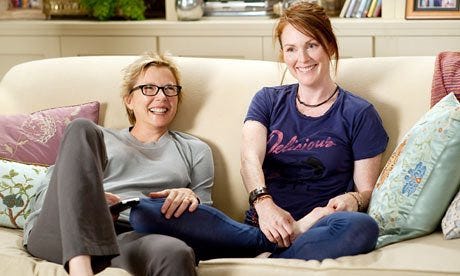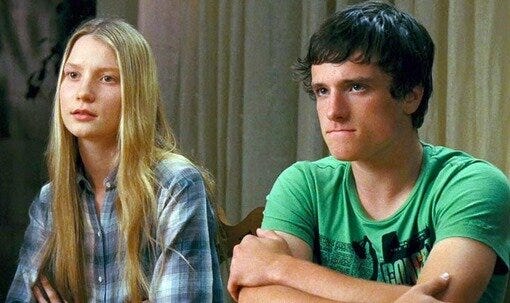the kids are all right
Film, 2010, 4.5 stars
Written: Lisa Cholodenko and Stuart Blumberg
Directed: Lisa Cholodenko
Spoiler warning! Apologies but giving my opinion requires giving away a plot twist - do not read if you like to stay spoiler free!
There are two very disparate opinions about this controversial “family” movie, and not many people fall in-between. On the one hand we have the people who think The Kids Are All Right, the film by now-veteran lesbian filmmaker Lisa Cholodenko, is one of the best depictions of marriage that they have ever seen. Not gay marriage, just marriage.
On the other hand there are the masses of lesbians who cannot stomach yet another film where a declared lesbian goes off and sleeps with a man. In fact, if people know nothing else about this film, they seem to know that Jules the lesbian sleeps with Paul, and that’s enough to make them not want to see it, full stop. I get that, I really do. Having spent many years writing about lesbian film, I feel like I’ve seen every cliché there is, and going in I thought I would hate it too.
Where I fall now in this seeming dichotomy of critical opinion is that I was tremendously moved by the film and the performances (not so much by Moore’s exaggerated Boston accent), but when the renowned scene happened, and with such unnecessary glee, I felt betrayed. In the middle of this objectively so-well-made film, surrounded by a film festival audience, I was sitting in the cinema shaking with rage. I felt for Bening’s character Nic. I felt that Jules was betraying the foundation of her values and beliefs, and that Cholodenko was betraying me as a lesbian viewer.
It took a lot of post-viewing soul-searching, but I gave it some more thought. Was I enraged at Cholodenko playing to the straight audience (which was my first reaction)? Or was I enraged at Moore’s character, what she was doing to herself, to her stated commitment to her family? I realised it was indeed the character I was mad at, and the film had so utterly engaged me, had so utterly made me want this family I was seeing onscreen to work, that the hole one of them was throwing herself into filled me with despair.
Then I realised, I loved this movie. By the end of it, I wished more than anything I could hang out in this world longer, just to see what would happen next.
Would I have preferred that the plot twist that tore them apart be something else? Absolutely, but Cholodenko is saying that you don’t get to pick the twist in life that derails you. I described it initially as lazy writing, but let’s face it, nothing enrages lesbian viewers like lesbians sleeping with men. Cholodenko knew what she was doing, stirring us all up like this.
I adore Julianne Moore, but in this film she was playing the “villain” of sorts (or at least, playing with the villain) so I’m still mad at her. Irrational but true. No, for me TKAAR was all about Annette Bening, and to a lesser extent the young Australian actress Mia Wasikowska and future Hunger Games star Josh Hutcherson, who all turned in standout performances.
In some ways I think Bening’s choice was even braver than Moore’s, playing the stoic breadwinner, the boring one, the wronged wife. It’s never the rewarding role, but Bening’s restraint in the first half of the film pays dividends later when Nic's emotional state bubbles to the surface.
I loved the slow cracks appearing, and the passionate defence of her family, like a lioness lashing out at the would-be intruder. I was familiar with some of Bening’s previous work, American Beauty and Being Julia mainly. The critical hype around her is well earned.
Nic was neurotic, annoying, adorable, overprotective, passive aggressive, at times condescending, but never once did we feel “She deserves this, she deserves to have her family ripped from her”, because she does not. She’s rigid in her beliefs and her love, but she shows nothing but passion and commitment, a fact that everyone – her kids, her wife – come to understand. Cholodenko is careful to make us see that over and above the normal problems caused by years of marriage, it was not Nic that caused the catastrophe, it was Jules and Paul.
I was crying as the credits rolled, wrestling with the subject matter of this film like I haven’t done for years. I overheard a woman muttering behind me, “Well, that film was certainly modern” and I almost snapped. Well lady, you know what this film was? It was overdue. It was alarming. It was infuriating. It was crazy good. I still want to hurl a copy of the script at Lisa Cholodenko’s head. I felt the same way after High Art if I recall correctly, and now that is one of my favourite films ever. Roger Ebert said it made him want to buy a steak, because even dinner looked that good.
Don’t let your immediate (and wholly justified) sense of betrayal stop you from watching this. Firstly, you can’t criticise with any validity what you have not seen. Secondly, you’re right, you might not like it. The feelings of betrayal might just be too much, and you just might not be able to get over it. However, if you love films that truly have something to say, then parts of it will still grab you and intrigue you, even if they also make you mad.
PS - Meryl Streep is often praised as being the premiere actress of her generation, but despite the lack of oscars on her shelves, surely there must be some write-in votes for Annette Bening?




